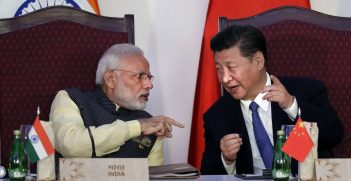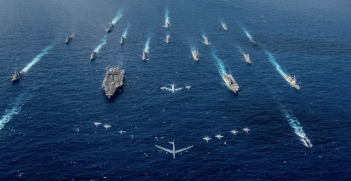Between Altruism and Necessity: Australia’s Regional Response to COVID-19
Australia is assisting its near neighbours, Timor-Leste and Papua New Guinea, in their fight against COVID-19. Beyond a humanitarian response, Australia’s support also reflects a deeper motive in an increasingly strategically challenged region.
As COVID-19 continues to ravage much of the world, Australia is stepping up to assist its near neighbours in their fight against the virus. After several years of falling aid spending, last October’s announcement of $500 million over three years for COVID-19 vaccines on top of an earlier $300 million commitment indicates that Australia is again demonstrating what retired Foreign Minister Gareth Evans referred to as “enlightened self-interest.”
Australia is providing vaccines to two of the country’s largest aid recipients, Timor-Leste and Papua New Guinea (PNG). There is, of course, a humanitarian impulse to such aid, but it also helps secure friendships in an increasingly volatile region.
Timor-Leste had been doing a remarkable job of containing COVID-19, which is especially noteworthy since it shares a sometimes porous land border with Indonesia, in which the virus has been running more or less unchecked. However, the April 2021 cyclone and floods which displaced thousands, particularly in the capital of Dili, threw into chaos the country’s social distancing and quarantine processes.
In PNG, that country’s health system was quickly overloaded by COVID-19 case numbers. This reflected the communal focus of life in PNG and highlighted the secondary impact of displacing others requiring non-COVID-19 related medical care.
In response, Australia has started delivering supplies of the Astra-Zeneca vaccine to Timor-Leste and PNG. In part this marks a simple increase in foreign aid. In the case of PNG, there is also concern that the virus could spread across the narrow sea border, among the Torres Straight Islanders who move freely between both countries.
There is, however, also a larger strategic interest in Australia sending vaccines to Timor-Leste and PNG. It is to help counter China’s “soft power” diplomacy in the region.
China has already demonstrated considerable interest in developing closer ties with Timor-Leste and PNG. In Timor-Leste this reflected in Chinese-built public buildings which dominate parts of Dili’s skyline.
Apart from China’s own outsized embassy on the waterfront, it also built Timor-Leste’s Foreign Ministry buildings, the presidential palace, the defence force headquarters, and army barracks. China also provided patrol boats as well as offering to build a radar array to detect illegal fishing in Timor-Leste waters. It was notable that the proposed radar, to be operated by Chinese staff, had a projected reach well in to the South-West Pacific.
Senior Timorese politicians have also mooted the idea of China developing the Greater Sunrise-Tasi Mane liquid natural gas field and processing facility which has so far failed to find foreign investment. Further, Timor-Leste’s sovereign wealth fund looks to decline over the coming years, at current rates of spending being completely empty in about ten years. With no other meaningful sources of income, there is concern that the country could become vulnerable to a Chinese “soft loan” debt trap, in which debt that cannot be paid is translated into other concessions.
China has also invested over $100 million in PNG and last year put up a $200 million plan to develop a commercial fishing fleet as part of a multi-billion dollar proposal to build whole city on Daru Island in the Torres Strait, a little over 100 kilometres from Australia. In response to Australian concern over the plan, the PNG government quickly said it had not seen the proposal, although a memorandum of understanding for the project had been signed by the regional governor. The proposal would, according to Australia, breach the Torres Strait Treaty between Australia and PNG, which only allows traditional fishing.
Beyond this, in 2018 PNG signed up to China’s Belt and Road Initiative which seeks to create a string of Chinese-oriented trade and investment links across the world. China’s interest in PNG is overwhelmingly focused on resources, including minerals and timber. After Australia, China is PNG’s second largest trading partner, with about a third of all trade.
If the Sinovac and Sinopharm vaccines get past their phase three trials and are rolled out in either or both countries, China will have further cemented these growing friendships. The question will be whether the Chinese vaccines sit alongside the Australian supplied Astra-Zeneca vaccine, or supplant it.
Reflecting a desire not to become captive of any other country, both Timor-Leste and PNG have become more assertive about their independence and have sought to broaden their international friendships. In particular, in Timor-Leste suspicion towards Australia has not fully recovered following fall-out with Australia over the Timor Gap negotiations. With PNG, although there has been no single critical issue, there is a sense among some PNG politicians that Australia sometimes overplays its “big brother” role, exacerbated by substantial longer term declines in aid to PNG.
Despite the diplomatic and potentially strategic advantages of aid, the Australian government has been parsimonious with its aid budget over the past decade. Stepping up to help fill an emergency vaccine relief vacuum means reversing that aid direction, at least with these two near neighbours.
China is under no illusion about the multiple purposes of aid. It has been demonstrating for several years its forthright willingness to use aid, in various forms, to achieve multiple goals.
As China grows in economic and strategic terms and becomes regionally more assertive, tensions have arisen between China and the US, and between China and US allies such as Australia. Within this context, the potential for vaccine competition appears to have persuaded the Australian government to reflect on aid in more clearly defined enlightened, as well as in self-interested, terms.
Damien Kingsbury held a Personal Chair and was Professor of International Politics at Deakin University until the end of 2020. He has written on developing country issues for the past four decades and has been a regular visitor to Timor-Leste since the mid-1990s. https://en.wikipedia.org/wiki/Damien_Kingsbury
This article is published under a Creative Commons License and may be republished with attribution.




